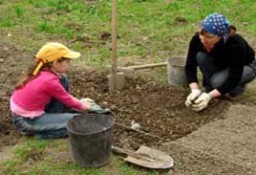The way we learn most naturally can help us find and fit into a new job, sometimes a better job! For example, I can think of several clients who worked for many years in construction, then sustained physical injuries that prevented them from doing physical labor or operating equipment. But, they wanted to stay in the construction field because they enjoyed working with and around structures, tools, machinery and everything that goes with building, maintaining or repairing our physical world.
They needed to retrain in order to work again. However, they lacked confidence
about educational upgrading due to poor performances in high school or
college. In assessing their learning styles, I discovered that they learned
well—but not through conventional book learning. Sure, they could force
themselves to go back to a classroom setting and suffer through it. We
‘can do’ many things through sheer will and determination but there is
always the risk that we will fail or not learn what we need to know in order to
be competent on the job, thereby jeopardizing our chances for getting and
keeping a new career.
Learning new skills is always easier when we are motivated to learn, not driven
to learn by the need for a new job, but motivated by tapping into our
natural learning styles. For example, many of these clients learned more
naturally through trying & doing, or by observing & examining, or by tinkering
& experimenting. Sitting in a classroom studying & reading books, then
memorizing and repeating what they read did not motivate them.
Retraining or upgrading skills then meant finding programs that matched their
natural way of learning (such as construction-estimating) that emphasized a
“hands-on” orientation versus a theoretical or academic one. In several cases,
an assessment of their stories also revealed a natural aptitude for working
with numbers and a knack for customer service, which matched up with jobs
related to Construction Estimator, Quote Coordinator, Proposal Writer,
Purchasing Manager, Builder Services Manager, Field Coordinator, and so on.
What is your innate pattern for learning?
When listening to your stories, I listen for clues to your natural talent for
learning: what are you doing when you’re motivated to learn? To what depth and
detail are you motivated to learn? What are the mechanisms through which you
learn? What circumstances or conditions motivate you to learn?
Natural talents for learning correlate with different kinds of career
situations. For example, someone who learns best by observing and
examining—that is, someone who is motivated to learn by taking a careful
first-hand look at the actual detail of an action—is probably better suited to
an apprenticeship-type environment than someone who is motivated to learn by
studying and reading (going over printed material, note-taking and underlining
key phrases).
Perhaps you did better in college programs organized around listening and
discussing activities than you did in high school, if the emphasis there was on
memorizing and repeating of information. You are motivated to learn only when
you are in a situation where you can hear the thoughts and ideas of others and
express their own. Perhaps you never realized before that your favorite job
was organized around frequent opportunities to brainstorm with others by
hearing their ideas and bouncing your own off them.
Did your parents complain that you always asked too many questions? If they
found it annoying, perhaps others noticed your knack for finding out things by
asking people questions. You are more than just curious, you have a knack for
probing and questioning others. You might thrive in jobs where that skill is a
recognized and rewarded as a core duty, such as investigations, or assessing
needs, or diagnosing problems.
Some talented and successful individuals get lousy grades in a classroom
setting but turn out to be specialists or experts when they are left to their
own devices to compile and collect information in their own way, at their own
speed, in order to get a comprehensive picture of a situation to understand,
explain, and predict certain principles, logic, philosophies, skills or
techniques.
I’ve had some hi-tech clients that thrived in lab environments where they could
experiment and tinker. They never read a book, and even failed certain college
courses. Luckily, many of these individuals were able to find jobs in school
helping a professor with certain research in order to pass. They could spend
hours conducting trials or tests to find out about a subject phenomenon and see
what happens. They easily fit into R&D work settings.
The real payoff is understanding why you learn and what is the outcome of your
learning. Once we understand your innate pattern for learning, I can link it
to specific jobs and careers that will reward you for what comes naturally and
effortlessly to you.

